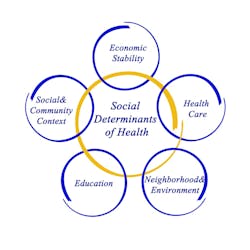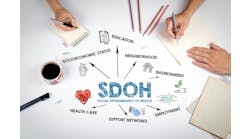Health insurer Highmark has announced its participation and commitment in support of the Gravity Project, an HL7 Fast Health Interoperability Resource (FHIR) accelerator, and public collaborative designed to standardize medical data used to identify social determinants of health (SDOH).
With rapidly increasing interest in collecting social risk data, the Gravity Project is a direct response to calls-to-action around the development of national standards for SDOH data reported in electronic health records (EHRs). The initiative seeks to identify coded data elements and associated value sets to represent SDOH signifiers documented in EHRs across four clinical activities—screening, diagnosis, planning, and interventions—with a focus on three social risk domains: food insecurity, housing instability, and transportation access, officials from Highmark—an independent licensee of the Blue Cross Blue Shield Association—explained.
“Due to the vast medical and socioeconomic needs surrounding the COVID-19 pandemic, the Gravity Project is moving forward with urgency. Today, standardized SDOH data is vital for identifying at-risk COVID-19 patients and intervening before the individual’s health is severely impacted,” they added.
Documenting and sharing SDOH-related assessment, diagnosis, and treatment information using progressive coding and exchange standards has the potential to improve whole-person care, well-being, and health outcomes, Highmark executives contend.
In a recent article that was part of a transformative trend story on FHIR, Evelyn Gallego, the Gravity Project’s program manager noted that the project was originally focused on identifying data definitions for documenting SDOH in clinical systems. That involves defining what is meant by food insecurity, housing instability, and transportation needs, and then developing coded data definitions and applicable codes and value sets for grouping them, she said.
But Lisa Nelson, the technical director of the Gravity Project, has suggested that the Gravity Project also consider a FHIR framework. “I remember saying to Evelyn that if you want to affect use cases that are oriented toward sharing this information–with researchers and organizations doing care coordination—it is insufficient to just generate a set of codes,” Nelson said. “You have to have sharing mechanisms that are standards-based. We tried to think how Gravity could reuse data-sharing methods being developed rapidly in other areas using FHIR but bring our content to those mechanisms.”
Highmark’s financial support of the Gravity Project will be utilized in contracted project management, project oversight for specific use case-driven projects, as well as HL7-rendered support and coordination services for the development of SDOH enabled FHIR based standards, according to officials.
“As a sponsoring partner, we’re proud to be a change leader in support of the communities we serve, especially in this time of unprecedented need,” said Deborah Donovan, Highmark Health Director, Social Determinants of Health, and Gravity Project Executive Committee Member. “Highmark continues to double-down on efforts to address barriers to health and well-being, and the Gravity Project serves as another important piece of the puzzle by creating the infrastructure to standardize the capture of SDOH insights, which will support advancements in population health management activities, right now and for years to come.”


